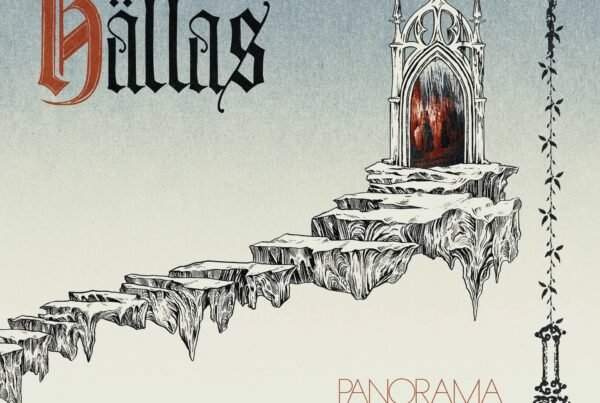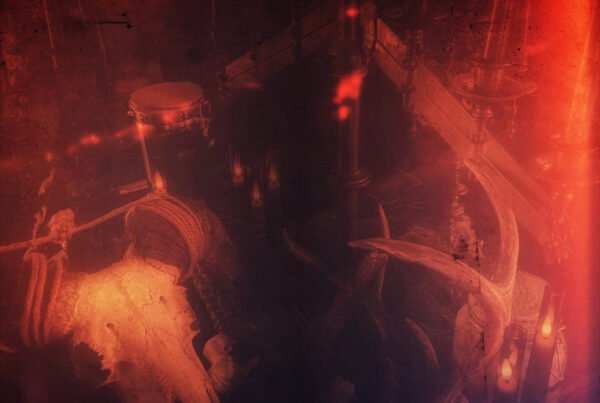An uncompromising journey into sound, Tunic‘s fourth full-length piles on the pounding dissonance in evocative and unexpected ways.
Release date: February 28, 2025 | Midwest Debris | Instagram | Facebook | Bandcamp
If you find yourself perusing this website, dear Reader, you probably agree with our creed: EVERYTHING is noise. We get ready for work in the morning by brewing ourselves a cup of coffee, get in our cars and head to work, stare into computer screens for 8 hours, then get back in our vehicles and do it all again. Maybe we’re listening to music during these trips to make the impending dissociation more bearable, maybe we’re not in the mood – but noise is inescapable. It’s everywhere we are, whether we’re seeking out what sounds best or just going about our days. We look back on the classical masterpieces from Mozart and Beethoven with a refined air, as though they are the pinnacle of controlled sound; meanwhile, at the time, musicians were considered servants, providers of entertainment as a cheap rush while other citizens did all the ‘real’ work. After all, beauty is in the ear of the beholder – music is an intensely subjective medium, and we all have distinct memories of playing our favorite artists for our parents only to receive the curt response: ‘it’s just noise.’
Winnipeg natives Tunic have no regard for those who listen to their especially desolate take on noise rock and respond with the ‘it’s just noise’ retort. Noise is just a starting point for their genuinely startling compositions, which freely move between atonal punk groveling, piledriving sludge, and ringing guitars not heard this side of Daughters‘ You Won’t Get What You Want (no surprise to see that album’s producer Seth Manchester takes up the same mantle here). Their previous album, 2023’s Wrong Dream, proved how focused their attack was, sculpting idea-heavy soundplay into 9 songs that mostly hovered around the 3-minute mark effortlessly; comparatively, A Harmony of Loss Has Been Sung features only 6 songs, yet runs about a minute longer, evidence of a band unafraid to take risks and approach their process differently. In the run-up to release, Tunic put out a statement declaring this album to be a ‘bad time‘ record, while detailing its inspiration as coming from the fallout of a very real topic: vocalist David Schellenberg’s wife having experienced a miscarriage. If so inclined to step down this dark rabbit hole, read on…
“Sorrow’s Grip” begins the album in about as understated a way as it gets for Tunic, which is to say: piercing feedback, no drums, and eerie spoken word. The things that are said here are vivid and disturbing, made all the more effective for the understated matter-of-factness of their delivery:
‘Why can’t we both collapse, be broken, be betrayed by our bodies?
Begging for any ounce of hope, joy, or any other words that
Describe our failed state of being?
It’s not hopeless, it’s just less hope…
What did we do to deserve this?…
I wasn’t unfazed, I was dead inside…’
As the simple, pounding drum beat comes in, the guitars start chopping through and the song takes shape – a hideous, desperate shape, to be sure. The bass growls sinisterly underneath the two-note guitar riff, underpinning Schellenberg’s anguished, shouted screeds. There are a couple points when the guitar and vocals drop off, leaving just the drums and bass lurching forward; something of a false dawn from the unrelenting darkness. The second time this happens, a maelstrom of hammering blastbeats and demented guitar scraping takes over – the lead vocal rises into a pained yelp while low background vocals repeat the song’s haunting mantra ‘In sorrow’s grip, loss takes its toll’. After this section pulverizes the listener for about 45 seconds, the tempo suddenly drops to half-time while the brain-frying guitar noise continues swaying unsettlingly overhead, and the shouting turns into screaming for dear life. When the abrupt ending arrives, you feel like you’ve been through five-and-a-half minutes of electroshock therapy. (in a good way) ((if such a thing can be considered good)) (((I just decided it can so it is)))
“Ordinary Unique Pain” flogs a deceptive 12/8 groove through numerous sections – relentless tom-and-cymbal bashing stand side-by-side understated, steadily building verses that sound like a waltz involving stumbling, undead zombies. The last minute layers on every preceding musical idea into a rush of grinding sound, wrapping the song up in appropriately painful fashion. But it’s the following “The Sharpening of a Blade” that contains some of the most terrifying audio on the entire album: after a buildup featuring just the thumping of percussion and despondent monologuing about disappointment echoing in the mind, the song takes another turn halfway through with deep-fried vocal distortion, off-kilter drumming, and guitar work that sounds like walls melting all around the listener. The claustrophobic intentions and craven wailing that dominate this half of the song bring to mind Chat Pile‘s output – both bands have a knack for taking depressing subject matter and spinning it into music that feels urgent, of-the-moment, and authentic, namely through brute-force rhythms and expressive (if unmelodic) vocals.
It’s clear well before the droning, almost-ambient “Spoiled Fruit” that Tunic achieved their stated goal: making a feel-bad listening experience. The integrity in the aggressive melancholy that permeates this album is quite unique, due in no small part to the attention to detail showcased both in the lyrics and the production. The band’s appreciation for dynamics is key, with every song taking its time to build up, release, and let linger the most uncomfortable sections and ideas. The closer “No Greater Loss” opens like an old Swans song from the 80s – replete with tribal tom work, shouted vocals cracking under their own pressure, and a foreboding industrial edge to the ambience – in a way that feels both familiar and fresh. As the song builds to yet another wall of harsh noise, the listener may feel themselves overcome with gloom, as if A Harmony of Loss Has Been Sung is too much to emotionally bear. And while it’s true that there is no hope in the music, Tunic instead achieve a kind of anti-nirvana, a place where hopelessness is accepted and lived with as an essential part of oneself.
The vision in making this album an unpleasant, anguished experience is breathtaking, frankly. If music is just about dancing away your negativity, this album is not for you – it’s for those of us who use music as catharsis for the negativity in our own lives, to let it bleed out while drinking in the pain of others. By this metric, Tunic and their music may not be ‘likeable,’ but it is uncompromising, thought-provoking, and effective – as all great art should be.






